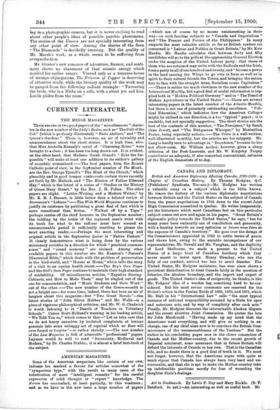CURRENT LITERATURE.
THE MINOR MAGAZINES.
There are one or two good papers of the " miscellaneous " charac- ter in the new number of the Lady's Realm, such as "The Cult of the Cat" (which is profusely illustrated), " Paris Ateliers," and " The Queen's Gardens." There is, however, an air of triviality and amateurishness about the short stories. It is high time, also. that Miss Arabella Kenealy's serial of "Charming Renee" were brought to a close ; it has been too long drawn out. It is evident, on the other hand, that Madame Sarah Grand's " Babs the Im- possible" will make at least one addition to its author's gallery of eccentric womanhood.—The best papers, from the Roman Catholic point of view, in the September number of The Month, are the Rev. George Tyrrell's " The Mind of the Church," which plausibly and in good temper controverts certain views recently set forth by Mr. Mallock, and " The Mission of Father Edmund Hay," which is the latest of a series of " Studies on the History of Queen Mary Stuart," by the Rev. J. H. Pollen. The other papers are slight. "Letter-Writing and a Modern Writer," by Mr. R. H. J. Steuart, is little better than a belated review of Stevenson's "Letters."—The Wide World Magazine continues to justify its existence by publishing a great deal of fact which is more sensational than fiction. " Walked off by, a Tiger " perhaps carries off the chief honours in the September number; the holding by the brute of the captured man's wrist with its teeth for what to the sufferer must have seemed an unconscionable period is sufficiently startling to please the most exacting reader.—Perhaps the most interesting and original article in the September Quiver is " Native Pastors!' It clearly demonstrates what is being done by the various missionary societies in a direction for which " practical common- sense" and "sound economy" are claimed. Among other readable papers in this number are Mr. Kearton's "Nature's Illustrated Bible," which deals with the problem of preservation in the bird-world, and " Horses at Home," which tells the story of a visit to an equine health resort.—The Boy's Own Paper and the Girl's Own Paper continue to maintain their high standard of readability. Of miscellaneous articles, "Negative Storing- Cabinets, and How to Make Them " may be singled out of the one for commendation, and "Music Students and their Work" out of the other.—The new number of the Commonwealth is not a bright one—for some time, indeed, there has been an air of languor about this magazine—but "Two Great Novels "—the latest stories of "John Oliver Hobbes" and Mr. Wells—is a piece of vigorous philosophical criticism, and Mr. W. G. Chadwick is worth listening to in "Dearth of Teachers in Voluntary Schools." Canon Scott-Holland's warning in his leading article, " We Told You so," which comes to this—" Let us take care that we do not hurry ourselves by irritated complaints at lenient generals into some unhappy act of reprisal which no Boer will ever forget or forgive "—is rather shrieky.—The new number of the Law Magazine is full of admirable "professional" papers. Laymen would do well to read " Suzerainty, Medieeval and Modern," by Dr. Charles Stubbs; it is almost a brief text-book of the subject.






































 Previous page
Previous page